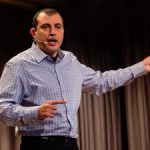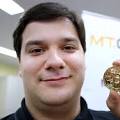Who Really Made Bitcoin? Notable Contributions From Different People
While Bitcoin was created by a Satoshi Nakamoto, it required (and still requires) community input and contributions to be what it is today and what it will be tomorrow. Thus it has many pioneers and advocates who helped (and who help) in its journey.
We compile a list below, of a few people who have made notable contributions in the advancement of Bitcoin, whether it is helping in its formation now and in the early years or by helping increase its adoption and publicity.
Satoshi Nakamoto
Satoshi Nakamoto's identity remains unclear but whether it is a single individual's name or a group of people, they made a great contribution to Bitcoin. Nakamoto introduced the idea of decentralized, P2P money as an alternative to conventional fiat, through a paper authored in October 2008. It described a peer-to-peer electronic system that would revolutionalize money and the way it works.
He then developed Bitcoin in 2009 citing the need for trustless money system in favor of the conventional currency that rely on trust to work and the vast amount of trust placed on central bank calling these the "root problem" for fiat and saying that the "history of fiat currencies is full of breaches of that trust." That brought huge privacy and security concerns according to him. This is not forgetting the fact that, in his own words, "the massive overhead costs" of central fiat systems "made micropayments impossible."
Ideally, he envisioned an "e-currency based on cryptographic proof, without the need to trust a third party middleman" to make money more "secure and transactions effortless." He cited multi-user time-sharing computer systems that had privacy and security problems before strong encryption came to be. Before strong encryption, "users had to rely on password protection to secure their files" and trust the system administrator to keep their information private and that was based on how the admin interpreted or judged the need for that privacy, he said.
"Then strong encryption became available to the masses, and trust was no longer required. Data could be secured in a way that was physically impossible for others to access, no matter for what reason, no matter how good the excuse, no matter what. It's time we had the same thing for money. With e-currency based on cryptographic proof, without the need to trust a third party middleman, money can be secure and transactions effortless."
Patrick Byrne
 Byrne is the CEO of the e-retailer giant Overstock.com, which became the first major retailer to accept Bitcoin as payment from as early as 2014. He has been an active proponent of Bitcoin since then.
Byrne is the CEO of the e-retailer giant Overstock.com, which became the first major retailer to accept Bitcoin as payment from as early as 2014. He has been an active proponent of Bitcoin since then.
Later in the same year, Overstock.com pledged to donate 3% of profits generated through bitcoin sales to advocacy organizations that promoted digital currencies.
And while most retailers cry foul of Bitcoin and cryptocurrency volatility even to date as a reason to not accept it for payment, the CEO was quoted as early as 2014 saying that volatility would not be a risk to Overstock.com because they would immediately convert Bitcoin to dollars or hedge Bitcoin risk through bitcoin-dollar derivatives that had not developed then.
He said Overstock.com started accepting Bitcoin for business reasons because avoiding credit-card transactions fees that amounted to 2 percent in 2014 would make Bitcoin sales more profitable.
And secondly, for philosophical reasons;
"I believe limited government is a better business model for our nation than is unlimited government (and limited government has the additional benefit of being consistent with our Constitution). Among the many vices of authoritarianism is that it can sustain itself only by offering more things to more people than it can actually deliver, and one way it makes up the difference is by debasing its currency."
He said people who share his belief in a limited government favor gold-back money as its rate grew by 2-3 per year and was limited in supply. Bitcoin, he said, was suited to online transactions and shared key virtues of gold, being constrained in supply and the fact that its supply would grow in a predictable manner.
Byrne was also responsible for launching T0 (TZERO), a company that aims to revolutionize the financial industry with blockchain technology -- or to make transactions more equitable, transparent and and accessible to all market participants.
The platform helps clients reduce transaction settlement times and costs, have more transparency and efficiency and auditability by integrating existing market processes with cryptographically secure distributed ledgers.
Tzero also has a Security Token Front-End which facilitates the trading of security tokens in an easy, compliant, and user-friendly manner. It is integrated with existing 15c3-5 risk management software, order management system, matching engine and other technologies that assist in the trading of security tokens.
Additionally, Overstock has put “millions of dollars into teams” for Ravencoin, a blockchain-based peer-to-peer network that facilitates transfer of assets between users. It is built on a fork of Bitcoin code and launched January 3rd, 2018.
Andreas M. Antonopoulos
 Andreas M. Antonopoulos is a well known proponent of Bitcoin and cryptocurrencies in general. He authored “Mastering Bitcoin,” a technical guide to understanding Bitcoin which is considered as the technical guide ever written about Bitcoin tech. He went on to author a second book, The Internet of Money, which talks about Bitcoin. The book became a bestseller on Amazon before he wrote The Internet of Money Volume Two.
Andreas M. Antonopoulos is a well known proponent of Bitcoin and cryptocurrencies in general. He authored “Mastering Bitcoin,” a technical guide to understanding Bitcoin which is considered as the technical guide ever written about Bitcoin tech. He went on to author a second book, The Internet of Money, which talks about Bitcoin. The book became a bestseller on Amazon before he wrote The Internet of Money Volume Two.
He is also a popular guest on the Joe Rogan Experience podcast in addition to participating and speaking in world conferences and events about cryptocurrencies and blockchain. Antonopoulos has launched several community open-source projects and is author of widely published author of Bitcoin-related articles and a permanent host on the Let’s Talk Bitcoin podcast.
Other than that, he is a teaching fellow at the University of Nicosia and serves on the Oversight Committee for the Bitcoin Reference Rate at the Chicago Mercantile Exchange. this is in addition to appearing as an expert witness in hearings around the world including the Australian Senate Banking Committee and the Canadian Senate Commerce, Banking and Finance Committee.
Mastering Ethereum (O’Reilly Media) is his forth book that is coming in the fall of 2018.
Ross Ulbricht and Uncle Sam
 Ross Ulbricht was the Silk Road marketplace mastermind from whom FBI seized 144,000 Bitcoins in 2013 during the closure of the marketplace. That made his the biggest single Bitcoin wallet at that time. Silk Road marketplace allowed people to sell things online paying with Bitcoins as early as 2013, but using Tor to hide identity and encryption data.
Ross Ulbricht was the Silk Road marketplace mastermind from whom FBI seized 144,000 Bitcoins in 2013 during the closure of the marketplace. That made his the biggest single Bitcoin wallet at that time. Silk Road marketplace allowed people to sell things online paying with Bitcoins as early as 2013, but using Tor to hide identity and encryption data.
Amidst claims of witchhunts by the government and authorities that opposed Bitcoin at that time and claims of unfair sentence, the marketplace was accused of drug dealings. In 2013, he was arrested and charged with money laundering, computer hacking, conspiracy to traffic narcotics through his online marketplace website, and sentenced to life imprisonment in 2015.
The circumstances of the arrest of Silk Road’s founder, Ross Ulbricht, led to many things that served to promote Bitcoin publicity in general rather than kill it. It also, for instance, led to the creation of USBKill, an anti-forensic software that serves as a kill switch if the computer falls in the wrong hands.
Charlie Shrem
 Charlie Shrem is an American entrepreneur, Bitcoin trader and advocate, a Bitcoin millionaire, the Director of Community and Business Development for Jaxx, which is a blockchain wallet startup, and the founder of the Bitcoin Foundation as well as CryptoIQ.co (which is an educational and investment firm).
Charlie Shrem is an American entrepreneur, Bitcoin trader and advocate, a Bitcoin millionaire, the Director of Community and Business Development for Jaxx, which is a blockchain wallet startup, and the founder of the Bitcoin Foundation as well as CryptoIQ.co (which is an educational and investment firm).
He is one of the earliest known investors of Bitcoin in addition to founding many crypto-related initiatives. He also served as the vice chairman of the Bitcoin Foundation, one of the largest Bitcoin advocates to date.
He has been an investor in Bitcoin since 2011. He started the BitInstant exchange out of New York City in September 2011, and it came to be the largest exchanges for Bitcoin in the world, allowing people to trade Bitcoins locally at more than 700,000 locations in the United States, Brazil, Russia and elsewhere.
Although he closed BitInstant in 2013 following advice from his lawyers, he was arrested in 2014 and charged with money laundering tied to the sale of illegal drugs -- in particular, they were arrested for planning the sale of more than $1 million worth of Bitcoin to users of the Silk Road.
He then, alongside Jason Granger, formed Intellisys Capital in 2016. Intellisys was a fund that allowed owners of Ethereum-based crypto token owners a share into fund investments in expectation for dividends. It dissolved in 2017.
He has released the "Geek in Prison," which is a personal encounter of his 15-month sentence in prison and how he helped increase adoption of Bitcoin from early days when it was unheard of. He is featured in the The Rise and Rise of Bitcoin, a documentary that explored the origins of Bitcoin. He is also featured in the 2016 documentary film Banking on Bitcoin that discusses how Bitcoin technology will shape lives.
Gavin Andresen
Andresen is known to have directly collaborated with Bitcoin’s creator to develop the source code for Bitcoin. He also has access to alert key that allows broadcasting of messages on critical problems on the Bitcoin network to all network clients.
is known to have directly collaborated with Bitcoin’s creator to develop the source code for Bitcoin. He also has access to alert key that allows broadcasting of messages on critical problems on the Bitcoin network to all network clients.
Nakamoto, who disappeared from public view after creation of Bitcoin, handed the source code repository and the alert key to Andreson.
Andreson served as the lead developer of Bitcoin, but stepped aside in April 2014 to focus all of his attention on serving as the Chief Scientist of the Bitcoin Foundation, although he has shifted focus to Bitcoin Classic recently.
Hal Finney
 Hal Finney was both a cryptographic activist who ran the first cryptographically based anonymous remailer, and a Bitcoin pioneer who created the first reusable proof-of-work system before Bitcoin. He used to post regularly on the cypherpunks listserv and ran a successful contest to break the export-grade encryption used by Netscape. This was before passing on in 2014.
Hal Finney was both a cryptographic activist who ran the first cryptographically based anonymous remailer, and a Bitcoin pioneer who created the first reusable proof-of-work system before Bitcoin. He used to post regularly on the cypherpunks listserv and ran a successful contest to break the export-grade encryption used by Netscape. This was before passing on in 2014.
Having tried to work his own RPOW and interested in cryptographic payment schemes, he liked Bitcoin when he knew of it. He became Bitcoin's code very first debugger (reporting via emails to Nakamoto who would fix the bugs) and contributor and recipient of the first Bitcoin transaction (10 Bitcoins) as a test from Satoshi Nakamoto in January 2009.
In his own account on Bitcointalk.com about Nakamoto, he said he thought he was working with "a young man of Japanese ancestry who was very smart and sincere."
He also worked as a developer (and first hires) for the PGP (email encryption software) corporation before retiring in 2011 and then passed on in 2014. Before passing on, he was also working on bcflick, an experimental software that uses Trusted Computing to improve Bitcoin wallet security.
Nick Szabo
 Nick Szabo is a computer scientist, legal scholar and cryptographer famous for his research in digital contracts and digital currency.
Nick Szabo is a computer scientist, legal scholar and cryptographer famous for his research in digital contracts and digital currency.
He created “bitgold,” a mechanism for a decentralized digital currency. It was never implemented, but it helped in the creation of Bitcoin 10 years later.
He is also credited for the invention of smart contracts, coining the term in as early as 1995 as “a set of promises, including protocols within which the parties perform on the other promises. The protocols are usually implemented with programs on a computer network, or in other forms of digital electronics. Thus these contracts are “smarter” than their paper-based ancestors. No use of artificial intelligence is implied.”
Even an Ethereum unit is named after Szabo to recognize his contribution on smart contracts.
In Bitgold, puzzles would be sent to the Byzantine fault-tolerant public registry then assigned to the public key of the solver. Each solution would be part of the next challenge, and this would form a chain of new property. This created a way that the network would use to verify and time-stamp new coins.
Mark Karpeles
 Mark Karpeles is the former CEO of the Bitcoin exchange, Mt. Gox, who has since joined VPN provider London Trust Media as its CTO in April 2018. Karpeles acquired the exchange from Jed McCaleb in 2011. The exchange went on to become the world's most popular bitcoin exchange but hackers were stealing money without the company discovering, until February 2014.
Mark Karpeles is the former CEO of the Bitcoin exchange, Mt. Gox, who has since joined VPN provider London Trust Media as its CTO in April 2018. Karpeles acquired the exchange from Jed McCaleb in 2011. The exchange went on to become the world's most popular bitcoin exchange but hackers were stealing money without the company discovering, until February 2014.
Mt. Gox hack led to many people losing millions of dollars of money (£4.5 billion worth of cryptocurrencies).
The company filed for bankruptcy in Japan in 2011 and in U.S. in 2014. Karpelès was later found guilty of fraud and tried in France in 2010, admitted to having pirated a server to French authorities and sentenced to a suspended year in jail. He was also arrested in Japan for accessing the exchange's data to falsify balances but was released on bail in July 2016.
Mt. Gox will repay creditors in Japanese Yen at a price around 400 US dollars per bitcoin, leaving Karpelès with bitcoins valued at nearly 2 billion US dollars. He later said in a Reddit Ask Me Anything (AMA) session that he did not want the Bitcoins that would be left after the repayment.
Recently, the bankruptcy trustee for Mt.Gox has been selling vast amounts of Bitcoins to facilitate repayment, and this has caused Bitcoin’s price to fall.
Roger Ver
 Roger Ver is CEO of Bitcoin.com and Bitcoin Cash creator and a well known Bitcoin advocate before creating Bitcoin Cash in August 2017. He was the first person in the world to start investing in Bitcoin startups and he helped fund the seed rounds for the entire first generation of Bitcoin businesses.
Roger Ver is CEO of Bitcoin.com and Bitcoin Cash creator and a well known Bitcoin advocate before creating Bitcoin Cash in August 2017. He was the first person in the world to start investing in Bitcoin startups and he helped fund the seed rounds for the entire first generation of Bitcoin businesses.
Memorydealers, his company, started accepting Bitcoin payments as early as 2011. Bitcoinstore.com, his website, also became the first to start accepting Bitcoin payments. He also created the Bitcoinbountyhunter.com that rewards people for helping catch cyber criminals in Bitcoin.
At one time, he offered a censorship-free alternative to facilitate discussions about cryptocurrencies and Bitcoin after the censorship of the Bitcoin community on Reddit, which he opposed.
In 2016, Ver issued a challenge worth $100,000 USD in Bitcoin to presidential candidate Bernie Sanders if he agreed to debate (about voluntaryism vs. patriotism) with Adam Kokesh, a US Marine Iraq War combat veteran turned anti-war activist and author. The money would be split in half and each of them would choose a charity where the money would go.
Sanders had mentioned Ver in a video, claiming that 1 percent of Americans who were denouncing citizenship and refusing to pay taxes were not patriots.
Max Keiser
 Max Keiser is an “anti-establishment” investor, journalist and economic activist who hosts “The Keiser Report” show in Russia Today. He is also former stockbroker, inventor of the virtual specialist technology and co-founder of the Hollywood Stock Exchange.
Max Keiser is an “anti-establishment” investor, journalist and economic activist who hosts “The Keiser Report” show in Russia Today. He is also former stockbroker, inventor of the virtual specialist technology and co-founder of the Hollywood Stock Exchange.
He is known for his sharp criticism of financial establishments and leaders with campaigns such as “Crash JP Morgan-buy silver” or the creation of the hedge fund “Karmabanque.” For instance, Keiser Report looks at shocking scandals in Wall Street and Capitol Hill and banking crime waves.
One of his latest defense for Bitcoin was after the critical opinion against Bitcoin came from JP Morgan’s CEO. He has been promoting the use of Bitcoin since as early as 2011.
In conclusion, Bitcoin has come a long way since the days of invention by Nakamoto, and still continues to reinvent itself with such extensions as Lightning Network and the many forks that dominate the space, to try and solve some of the dominant problems of the original Bitcoin such as network congestion, low scalability and low adoption.


